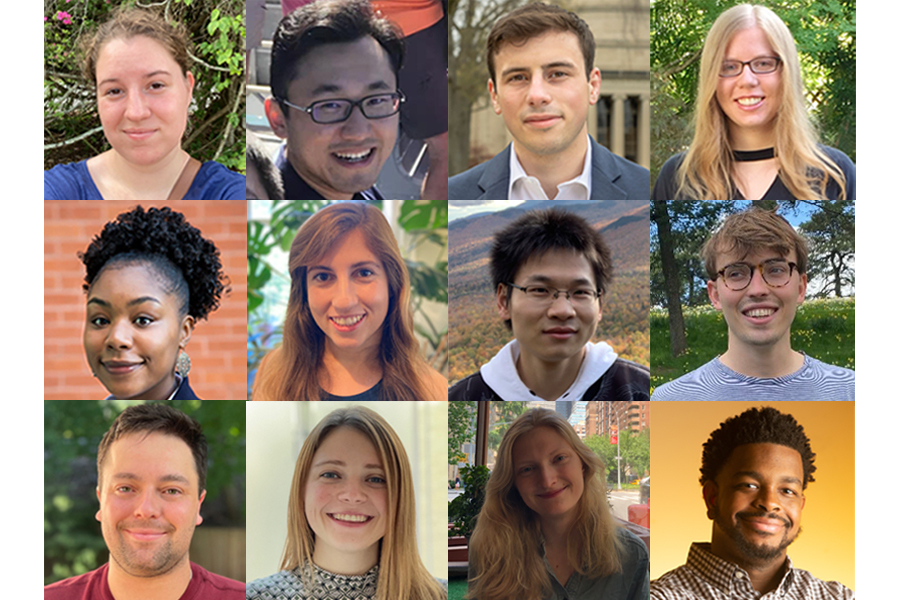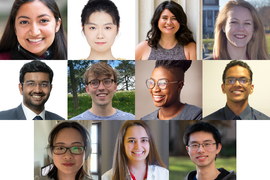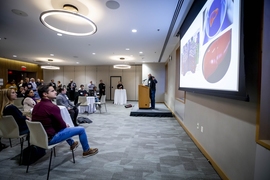The MIT-Takeda Program, a collaboration between MIT’s School of Engineering and Takeda Pharmaceuticals Company, fuels the development and application of artificial intelligence capabilities to benefit human health and drug development. Part of the Abdul Latif Jameel Clinic for Machine Learning in Health, the program coalesces disparate disciplines, merges theory and practical implementation, combines algorithm and hardware innovations, and creates multidimensional collaborations between academia and industry.
With the aim of building a community dedicated to the next generation of AI and system-level breakthroughs, the MIT-Takeda Program is also creating educational opportunities. Every year Takeda funds fellowships to support graduate students pursuing research related to health and AI. This year’s Takeda Fellows, described below, are working on projects ranging from electronic health record systems and robotic control to pandemic preparedness and traumatic brain injuries.
Camille C. Farruggio
Farruggio is a PhD candidate in the Department of Materials Science and Engineering whose research leverages AI and machine learning, including regression modeling, to help realize the promise of cells-as-medicine applications. As a Takeda Fellow, she seeks to develop a holistic understanding of the culture conditions and cell attributes that modulate and predict cell efficacy as therapeutic treatments and solve existing technology bottlenecks in the production of cell therapies.
Wenhao Gao
Gao is a PhD candidate in the Department of Chemical Engineering who aims to accelerate biological and chemical discovery processes. His work specifically focuses on AI for health sciences and cutting-edge applications of machine learning for molecular discovery and drug development. Gao’s research, supported by a Takeda Fellowship, seeks to create a more efficient process, using AI algorithms to advance de novo design methods and organic synthesis for accelerated drug development.
Samuel Goldman
Goldman is a PhD candidate in the Computational and Systems Biology Program whose research interests lie at the intersection of biology, analytical chemistry, and machine learning. Specifically, Goldman uses mass spectrometry data and generative deep learning to elucidate the structures of unknown molecules in biological samples, with important implications for drug discovery. As a Takeda Fellow, he will build new computational tools to characterize and measure unknown small molecule metabolites in a cellular mixture.
Sarah Gurev
Gurev is a PhD candidate in the Department of Electrical Engineering and Computer Science. Her research seeks to address the challenges of pandemic preparedness and the prediction of viral immune evasion. As a Takeda Fellow, Gurev will advance her work at the intersection of computational approaches and experimental screening to develop new models of antibody escape.
R’mani Haulcy
Haulcy is a PhD candidate in the Department of Electrical Engineering and Computer Science whose work bridges the fields of AI and health to create cutting-edge AI-based assessments of cognitive impairment in speech and language disorders. Supported by a Takeda Fellowship, Haulcy will develop new tools for speech processing focused on the measurement of health-related speech biomarkers, specifically examining the speech of subjects with frontotemporal dementia and primary progressive aphasia.
Velina Kozareva
Kozareva is a PhD candidate in the Computational and Systems Biology Program whose research focuses on developing machine learning methods to integrate multi-omic data in heterogeneous diseases. As a Takeda Fellow, Kozareva aims to develop computational methods to simultaneously identify subtypes of heterogeneous diseases and the causal mechanisms that drive each subtype, with an initial focus on amyotrophic lateral sclerosis.
Yang Liu
Liu is a PhD candidate in the Department of Electrical Engineering and Computer Science whose current work focuses on AI for health records and computational imaging/photography, which lies at the confluence of computer science, optics, biomedical/neuroscience, hardware design, and software design. Liu’s Takeda Fellowship will support his current research, a collaborative project that aims to address the connected challenges of delivering health care and maintaining health-care records in resource-constrained settings.
Luke Murray
Murray is a PhD candidate in the Department of Electrical Engineering and Computer Science whose work is focused on electronic health record (EHR) systems, which have revolutionized health care and hold tremendous potential for clinical diagnosis, operations, and research, but also suffer from serious shortcomings. Through his Takeda Fellowship, Murray will tackle a primary EHR limitation: disparate interfaces that fragment the clinical workflow into time-consuming, error-prone processes that require clinicians to spend more time interacting with EHRs than with patients.
Mark Olchanyi
Olchanyi is a PhD candidate in the Harvard-MIT Program in Health Sciences and Technology whose research seeks to advance our knowledge of traumatic brain injuries (TBIs). Olchanyi’s research, supported by a Takeda Fellowship, will apply deep learning to study in vivo imaging-based TBI biomarkers, with a particular focus on subcortical white matter lesions in acute TBIs resulting in disorders of consciousness.
Krista Pullen
Pullen is a PhD candidate in the Department of Biological Engineering whose research is situated at the intersection of vaccine immunology and machine learning. With the support of a Takeda Fellowship, Pullen will develop and validate the application of cross-species modeling in the context of vaccine immunology to enable the prediction of human efficacy from preclinical data.
Georgia Thomas
Thomas is a PhD candidate in the Harvard-MIT Program in Health Sciences and Technology whose research explores the underlying physics of optical imaging, with the goal of expanding its capacity to address important medical challenges. As a Takeda Fellow, Thomas will advance her work to create innovative tools to better understand and treat coronary atherosclerosis, a disease affecting over 18 million people in the United States alone.
A. Michael West Jr.
West is a PhD candidate in the Department of Mechanical Engineering whose research integrates robotics, AI, and health care to improve robotic rehabilitation and advance human-robot interactions. Specifically, his work explores the human neuromotor control of movement, with the goal of enhancing robot control and performance. As a Takeda Fellow, West will study the functionality of the human hand and its ability to manipulate objects and tools.








